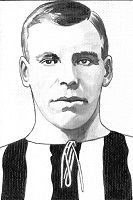Bill Agnew

Bill Agnew, born in 1880, in Kiln Row by Gatehead itself by Kilmarnock was a son of coal. His father was a miner there and later in New Cumnock and in the latter Bill followed him until football provided the way out of the pit.
He began his progress in the game with New Cumnock team, Afton Lads, moving, a full-back, aged nineteen to Kilmarnock in 1900 and for two seasons. And there he attracted the interest of English clubs, leading to a move in 1902 at twenty-one to Newcastle, where, having first returned to New Cumnock to marry Maggie Marshall, in two seasons, he made a substantial forty-three appearances but with the bulk in the first. After that he seemed to lose form and be replaced in the First Eleven by Jack Carr.
As a result Agnew moved on, but not far. He signed for two more seasons in the same division but with Middlesbrough. From there it was a return to Scotland, indeed to Kilmarnock, again for two years. And at home he seemed to recover form or perhaps mature. He not only marshalled the defence but scored goals, with international recognition following. He won one cap in 1907 and two more in 1908, at which point English interest revived. In 1908 he was signed by Sunderland.
Agnew remained on Wearside for two season but without particular success, returning just short of his thirtieth birthday to Falkirk to play first for the town club itself and then, after a knee injury, for a final season before The Great War as an amateur with East Stirling. He and Maggie, and their five children then moved to Glasgow, where he worked in insurance for the Prudential and turned his sporting attention to bowls. He won the Scottish Rink Championship in 1926 and bowled for Scotland in 1928. He even died on the bowling green, at an open tournament in Moffat he had already won twice. The year was 1936 and he was just fifty-six years of age.
Willie Agnew was buried in Cathcart but his grave is either unmarked or is one of the several, indeed too many, headstones in the cemetery that have toppled and simply left where they lie. It is something the authorities might do well to rectify.
Birth Locator:
1880 - Kiln Row, Gatehead by Kilmarnock
Residence Locations:
1881 - Thirdpart by Rugby Park, Kilmarnock
1891 - Burnfoot Row, New Cumnock
1901 - Dalleagles, New Cumnock
1904 - Craigbank Terrace, New Cumnock
1911 - 91, Academy St., Falkirk
1921 - 643, Pollokshaws Rd., Glasgow
1936 - "Davaar", 51, Glenpatrick Rd., Elderslie
Death Locator:
1936 - Moffat Bowling Club
Burial Locator:
Back to Cathcart Cemetery,
or the SFHG Home page